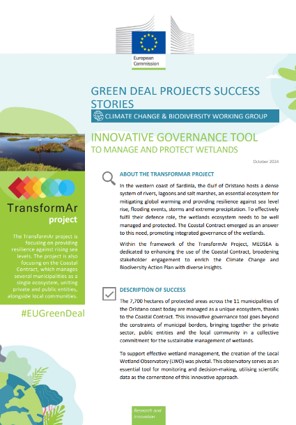About the project
The Gulf of Oristano, on the western coast of Sardinia, hosts a dense system of rivers, lagoons and salt marshes; an essential ecosystem for mitigating global warming and providing resilience against sea-level rise, flooding events, storms and extreme precipitation. To effectively fulfil their defence role, the wetlands ecosystem needs to be well managed and protected. The Coastal Contract emerged as an answer to this need, promoting integrated governance of the wetlands.
Within the framework of the TransformAr Project1, MEDSEA is dedicated to enhancing the use of the Coastal Contract to broaden stakeholder engagement and enrich the Climate Change and Biodiversity Action Plan with diverse insights.
Description of success
The 7,700 hectares of protected areas across the 11 municipalities of the Oristano coast today are managed as a unique ecosystem, thanks to the Coastal Contract. This innovative governance tool goes beyond the constraints of municipal borders, bringing together the private sector, public entities, and the local community in a collective commitment for the sustainable management of wetlands.
To support effective wetland management, the creation of the Local Wetland Observatory (LWO) has been pivotal. This observatory serves as an essential tool for monitoring and decision making and utilising scientific data is the cornerstone of this innovative approach.
Highlights
Innovative collaborative governance: The Coastal Contract demonstrates how multi-level collaboration can be leveraged to address both environmental sustainability and economic growth.
Enhanced awareness: The increased awareness of the importance of wetlands has strengthened local cultural identity and promoted nature-based solutions for climate resilience.
Evidence-based decision-making: The Local Wetland Observatory has ensured that every action taken is supported by scientific data to effectively respond to the needs of ecosystems and communities.
Improvement in the quality of life of local communities: achieved by safeguarding natural resources and promoting sustainable practices.
Outputs
The project involved a number of entities and actions aimed at mitigating the impacts of climate change on coastal wetlands:
The official agreement signed in 2021 by 14 entities, including municipalities, local and regional authorities for the integrated and sustainable management of the Wetland of Oristano.
An Action Plan with 50 actions related to biodiversity, natural resources and landscape protection, climate change resilience, green economy, communication and environmental education.
More than 40 participatory meetings with local public and private stakeholders organised to raise awareness on climate issues and the role of coastal wetlands to mitigates climate impacts.
Impact
The Coastal Contract establishes shared objectives for wetlands conservation across multiple stakeholders, thereby strengthening collaboration and ensuring sustained commitment for the future. It preserves biodiversity and fosters innovative economic models based on the green economy, low carbon emissions and the adequate protection and enhancement of natural resources. This approach not only facilitates but also attracts local, national and international funds for wetland restoration.
Lessons
The main challenge was the construction of a shared action plan among various stakeholders that identified strategic actions of priority importance for the conservation of the entire wetland system, overcoming municipal administrative boundaries and individual interests. This was achieved through a long series of territorial meetings based on a consolidated participatory approach.
Challenge of fragmentation in water resource management can be overcome through constructive dialogue and the sharing of experiences and expertise, emphasising the importance of cooperation and coordinated planning.
Other information
Within the framework of the TransformAr Project, partners are dedicated to enhancing the use of the Coastal Contract broadening stakeholder engagement to enrich the Action Plan with diverse insights. This effort intends to incorporate new challenges that the territory and its communities are likely to encounter, developing suitable measures to address them effectively.
Looking towards a broader territorial scale, the success of the Coastal Contract offers a valid example for similar initiatives at national and international levels. Its ability to bring together different stakeholders around common sustainability goals provides a replicable model that can inspire further progress towards achieving the objectives of the European Green Deal.

Figure 1: Coastal Contract Governance. ©TransformAr 2024

Figure 2: Coast of Oristano. ©TransformAr 2024

